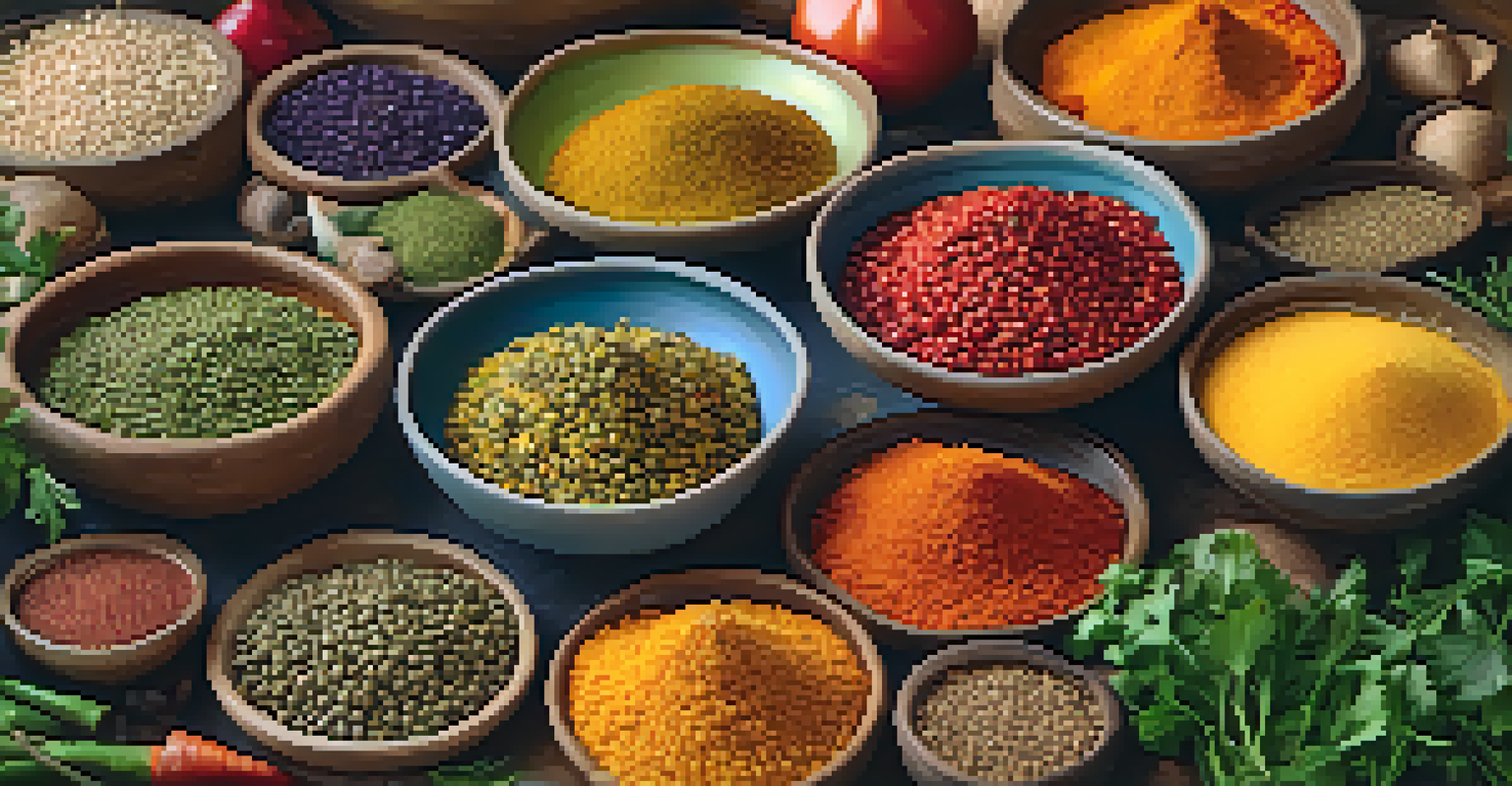Integrating Nutrition with Traditional Medicine Practices

Understanding Traditional Medicine and Its Roots
Traditional medicine encompasses various healing practices that have been passed down through generations. These approaches often incorporate the use of natural ingredients, rituals, and beliefs that connect the mind, body, and spirit. Understanding these roots is crucial for integrating nutrition effectively, as many traditional practices emphasize the importance of food as medicine.
Let food be thy medicine and medicine be thy food.
For instance, in Traditional Chinese Medicine (TCM), food is categorized based on its properties and effects on the body. This perspective encourages individuals to choose foods that harmonize with their unique health conditions, illustrating how nutrition plays a foundational role in traditional healing. By recognizing these principles, we can better appreciate the synergy between nutrition and traditional practices.
Moreover, traditional medicine often relies on local and seasonal foods, which not only support personal health but also promote community sustainability. This holistic view fosters a deeper connection to food, encouraging mindful consumption that aligns with traditional healing philosophies.
The Role of Nutrition in Holistic Healing Practices
Nutrition is often regarded as a cornerstone of holistic health, emphasizing the connection between diet and overall well-being. In many traditional medicine systems, what we eat directly influences our physical and emotional health. This relationship underscores the importance of integrating nutritious foods into treatment plans to enhance healing outcomes.

For example, Ayurvedic medicine categorizes foods based on their energetic qualities, advising individuals to select foods that balance their doshas—essentially their constitution. This personalized approach not only supports physical health but also fosters emotional stability by aligning diet with individual needs. Therefore, integrating nutrition becomes a vital part of the healing journey.
Nutrition is Key to Healing
Integrating nutrition into traditional medicine enhances healing outcomes by aligning dietary choices with individual health needs.
By focusing on nutrient-dense foods that support bodily functions, practitioners can create comprehensive wellness strategies. This fusion of nutrition and traditional practices empowers individuals to take charge of their health, leading to improved vitality and resilience.
Cultural Perspectives on Food and Healing
Cultural beliefs play a significant role in shaping how different societies perceive food and its healing properties. In many cultures, specific foods are associated with rituals or celebrations, reinforcing the connection between food and community health. This cultural lens is essential when considering how to integrate nutrition into traditional medicine practices.
The greatest medicine of all is to teach people how not to need it.
In Native American traditions, for example, certain plants and herbs are revered not only for their nutritional benefits but also for their spiritual significance. This duality highlights the importance of understanding cultural contexts when recommending dietary changes or practices. By honoring these traditions, healthcare practitioners can foster trust and respect in their relationships with patients.
Recognizing these cultural perspectives enables a more nuanced approach to nutrition in healing. It opens the door for collaboration between traditional healers and nutritionists, creating a richer, more effective healthcare experience for individuals seeking holistic wellness.
Practical Strategies for Integrating Nutrition
Integrating nutrition with traditional medicine doesn't have to be complex; it can start with simple, practical strategies. One effective approach is to create personalized meal plans that align with traditional healing practices. By tailoring nutrition to support specific health goals, individuals can enhance the efficacy of their traditional treatments.
For instance, if a patient is dealing with digestive issues and follows a traditional system like TCM, incorporating foods recognized for their digestive benefits, such as ginger or warm broths, can provide immediate support. These small adjustments can make a significant difference in overall health and treatment success.
Cultural Context Matters
Understanding cultural perspectives on food and healing is essential for effective nutrition integration in traditional practices.
Additionally, educating patients about the nutritional properties of traditional foods empowers them to make informed choices. Workshops that combine cooking demonstrations with traditional medicine teachings can bridge the gap between nutrition and holistic healing, making the integration process enjoyable and accessible.
Case Studies: Successful Integrations of Nutrition
Examining real-life case studies can provide insight into the successful integration of nutrition with traditional medicine. One notable example is a program in India that combined Ayurvedic practices with modern nutrition principles. Patients reported improved health outcomes and satisfaction by following a diet rich in whole, locally sourced foods tailored to their unique doshas.
Another case involves a community health initiative in Africa that utilized traditional herbal remedies alongside nutritional education. This program aimed to combat malnutrition while respecting cultural practices, resulting in a significant increase in dietary diversity and overall health in the community. These examples highlight the potential of integrating nutrition into traditional healing frameworks.
By documenting such success stories, we can inspire further collaboration between nutritionists and traditional healers. These collaborations not only enhance individual health outcomes but also contribute to the preservation of cultural practices and knowledge.
Challenges in Integrating Nutrition with Traditional Medicine
While the integration of nutrition and traditional medicine holds immense potential, it is not without its challenges. One significant hurdle is the lack of standardized nutritional education within traditional healing practices. Many traditional healers may not have formal training in nutrition, leading to gaps in knowledge about the nutritional value of various foods.
Additionally, there can be resistance from both practitioners and patients when it comes to changing long-held beliefs about food and healing. Traditional practices are often steeped in cultural significance, and introducing new nutritional concepts may be met with skepticism. This highlights the need for respectful dialogue and education to foster understanding.
Future of Holistic Health
The future of healthcare looks promising as increased collaboration between nutritionists and traditional healers can enhance overall well-being.
Overcoming these challenges requires collaboration and open-mindedness from both nutritionists and traditional healers. By working together, they can create a shared framework that respects traditional practices while incorporating the benefits of modern nutrition science.
The Future of Nutrition in Traditional Medicine
Looking ahead, the future of integrating nutrition with traditional medicine appears promising. As more people seek holistic health solutions, there is a growing recognition of the importance of diet in traditional healing practices. This shift could lead to more collaborative efforts between nutritionists and traditional healers, enhancing the overall effectiveness of health interventions.
Moreover, advancements in research and technology present exciting opportunities to explore the synergies between nutrition and traditional practices. For example, studies on the bioactive compounds found in traditional foods can provide valuable insights into their healing properties, paving the way for evidence-based recommendations.

Ultimately, as we embrace a more integrative approach to health, the lines between nutrition and traditional medicine will continue to blur. This evolution promises to enhance individual well-being and promote a more comprehensive understanding of health that honors both modern science and time-honored practices.